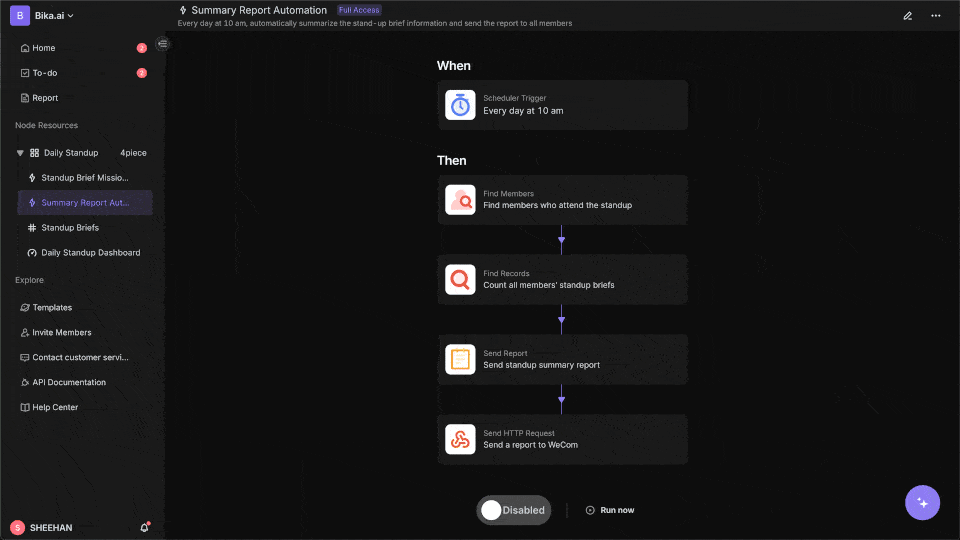
Grow Faster, Work Less: Top Marketing Automation Tools for Startups
Why Marketing Automation is Crucial for Startups in 2025
In 2025, startups are navigating a highly competitive business landscape with a unique set of challenges. Limited budgets and small teams often mean that every resource, both time and money, must be stretched thin. Yet, the need for rapid growth is more pressing than ever. Marketing automation has emerged as a game - changer for these early - stage businesses.
Marketing automation refers to the use of software platforms and technologies to automate repetitive marketing tasks. These tasks can range from sending out email campaigns, managing social media posts, to tracking customer interactions. For startups, the core purpose of marketing automation is to streamline marketing processes, allowing them to do more with less.
The benefits of marketing automation tools for start - ups are numerous. Firstly, efficiency is significantly enhanced. Startups can automate time - consuming tasks such as email list segmentation, lead scoring, and follow - up emails. This frees up valuable time for marketing teams to focus on more strategic initiatives, like developing creative campaigns or analyzing market trends.
Secondly, consistent lead nurturing becomes possible. Marketing automation tools can be programmed to send personalized messages to leads at different stages of the sales funnel. This ensures that potential customers are engaged regularly, increasing the likelihood of conversion. For example, a startup in the software - as - a - service (SaaS) industry can use automation to send product - specific emails to leads based on their interests, such as a free trial offer for a particular feature they've shown interest in.
Personalized communication is another key advantage. By leveraging customer data, marketing automation tools can create tailored messages for different segments of the customer base. This not only improves the customer experience but also boosts brand loyalty. Startups can use data on past purchases, browsing behavior, or demographic information to send relevant content, making their marketing efforts more effective.
Data - driven decisions are also facilitated. Marketing automation platforms collect and analyze data from various sources, providing startups with valuable insights. These insights can be used to optimize marketing campaigns, understand customer behavior better, and allocate resources more effectively. For instance, if an automation tool shows that a particular email campaign has a high click - through rate, a startup can invest more in similar campaigns.
Finally, scalability is a major benefit. As startups grow, their marketing needs become more complex. Marketing automation tools can easily scale to accommodate these changes, whether it's handling a larger customer base, expanding into new markets, or launching new products.
:::: key-takeaways ::::
- Marketing automation boosts efficiency by automating repetitive tasks, saving time for strategic marketing initiatives.
- It enables consistent lead nurturing through personalized communication, increasing conversion rates.
- Startups can make data - driven decisions and scale their marketing efforts as they grow with the help of marketing automation tools. ::::
Top Marketing Automation Tools for Startups
In this section, we'll explore a curated list of leading marketing automation tools suitable for startups. These tools have been selected based on their functionality, ease of use, and cost - effectiveness, making them ideal for early - stage businesses.
Brevo
Brevo is a comprehensive marketing automation platform that offers a wide range of features. Its core strength lies in its email marketing capabilities, which are both powerful and user - friendly. It's an excellent choice for startups that are looking to build and grow their email subscriber lists.
Key features relevant to startups include its drag - and - drop email editor, which allows non - technical users to create professional - looking emails quickly. It also offers seamless CRM integration, enabling startups to track customer interactions and manage leads effectively. The landing page builder is another useful feature, helping startups create high - converting landing pages for their marketing campaigns. In terms of pricing, Brevo offers a free plan with basic features, making it accessible for startups on a tight budget. As the business grows, there are also affordable paid plans with more advanced features.
One of the pros of Brevo is its simplicity. It's easy to set up and use, even for those new to marketing automation. However, some startups may find that the more advanced features require a bit of learning curve.
 Brevo
Brevo
HubSpot
HubSpot is a well - known name in the marketing automation space. It's a great fit for startups that are looking for an all - in - one solution. HubSpot offers a suite of tools that cover marketing, sales, and customer service.
The key features for startups include its lead scoring system, which helps prioritize leads based on their behavior and engagement. The email marketing tool is highly customizable, allowing startups to send targeted and personalized emails. HubSpot also has a powerful analytics dashboard that provides in - depth insights into marketing campaign performance. The platform's CRM is integrated across all its tools, ensuring a seamless flow of data.
HubSpot's strength is its comprehensive nature. However, the pricing can be a bit steep for some very early - stage startups. It offers a free CRM, but the more advanced marketing automation features come with a cost.
 HubSpot
HubSpot
Customer.io
Customer.io is focused on customer - centric marketing automation. It's particularly well - suited for startups that want to deliver highly personalized messages to their customers at the right time.
The platform's key features include its event - based messaging system. Startups can trigger emails, in - app messages, or push notifications based on specific customer actions, such as a purchase, a sign - up, or a page visit. Customer.io also offers advanced segmentation capabilities, allowing for highly targeted messaging. The analytics provided are focused on understanding customer behavior and engagement.
One of the pros of Customer.io is its ability to create highly relevant and timely messages. However, it may be a bit more complex to set up compared to some other tools, and it may not be the most cost - effective for startups with very basic marketing needs.
 Customer.io
Customer.io
Mailchimp
Mailchimp is a popular marketing automation tool, especially known for its email marketing. It's a great option for startups that are just getting started with marketing automation and want an easy - to - use platform.
Mailchimp offers a simple drag - and - drop email builder, making it accessible for beginners. It also has basic CRM features, allowing startups to manage their contacts. The platform provides analytics on email campaign performance, such as open rates, click - through rates, and unsubscribe rates. Mailchimp has a free plan for small lists, which is very attractive for startups on a budget.
The simplicity of Mailchimp is its biggest advantage. However, as startups grow and their marketing needs become more complex, they may find that Mailchimp's features are somewhat limited compared to more advanced tools.
 Mailchimp
Mailchimp
Essential Features to Look for in Marketing Automation Tools for Your Startup
When choosing marketing automation tools for start - ups, several key features and considerations should be taken into account.
Ease of Use/User Interface: Startups often have small teams with limited marketing resources. A tool with an intuitive user interface is crucial. This allows team members to quickly learn how to use the tool and start automating their marketing tasks without extensive training. For example, a drag - and - drop email editor or a simple dashboard for managing campaigns can save a lot of time and effort.
Pricing/Scalability: Given the limited budgets of startups, pricing is a major factor. Look for tools that offer a freemium model or affordable tiered plans. A freemium plan allows startups to test the waters and see if the tool meets their needs before committing to a paid plan. As the startup grows, the tool should also be able to scale easily. This means that the pricing structure should be flexible, and the tool should be able to handle an increasing volume of data and marketing activities.
Core functionalities: Email marketing is often a core functionality for startups. The tool should be able to send personalized, targeted emails, manage email lists, and provide analytics on email performance. Lead scoring is another important feature. It helps startups prioritize leads and focus their sales efforts on the most promising prospects. CRM integration is also essential, as it allows for a seamless flow of data between marketing and sales teams. Analytics capabilities are crucial for measuring the success of marketing campaigns and making data - driven decisions.
Integration capabilities: Startups usually use a variety of other tools, such as CRM systems, sales tools, and website builders. The marketing automation tool should be able to integrate with these existing tools. For example, integrating with a CRM system allows for better lead management, while integration with a website builder can help track website visitors and convert them into leads.
Customer Support & Resources: In case of any issues or questions, reliable customer support is essential. Look for tools that offer comprehensive documentation, tutorials, and responsive customer support teams. This ensures that startups can get the help they need quickly and keep their marketing automation running smoothly.
Beyond Standalone Tools: Elevating Marketing Automation with Workflow Integration
While marketing automation tools are great for handling specific tasks, the real power lies in connecting and automating marketing workflows. Platforms like Bika.ai can take marketing automation to the next level by orchestrating complex, cross - platform campaigns.
Bika.ai can enhance the capabilities of your chosen marketing automation tools. For example, it can enable deeper personalization by combining data from multiple sources. This means that the messages sent through your email marketing tool (like Brevo or Mailchimp) can be even more tailored to the individual customer. Seamless data flow between systems is another major benefit. For instance, data from your CRM (integrated with HubSpot or Customer.io) can be automatically transferred to your email marketing tool, allowing for more targeted email campaigns. Automated customer journeys can be created, where a customer's interaction with one marketing channel (such as a website visit) triggers a series of actions across other channels (like an email follow - up). This not only improves the customer experience but also increases operational efficiency.

Real - World Automation: The Bika.ai AI Automated X Tweets Template for ``
The AI Automated X Tweets Template on Bika.ai is a powerful example of how marketing automation can be made more intelligent and efficient. This template is designed to address the common challenge of managing an X (Twitter) account.
💡 Why Use "AI Create X Tweets Automatically"
Managing an X (Twitter) account requires consistent activity. Normally, the process of writing, scheduling, and posting tweets can be time - consuming. With the "AI Automated X Tweets" template, this process is streamlined. It allows users to schedule and automate tweets, ensuring regular posting without daily manual intervention.
👉 How the Template Works
The template consists of a database and an automation task. The "X Tweet Content" database stores pre - written tweets along with their scheduled posting dates. The "AI Automated X Tweets" automation runs daily at 10:00 AM. It retrieves tweets scheduled for that day from the database and posts them to the X (Twitter) account via the X API.
🎯 Steps to Use
- Install the Template: Install the template into your Bika.ai space. Multiple installations are possible if you need to manage multiple X accounts with different themes.
- Add New Tweets: The pre - built "X Tweet Content" database has fields for tweet content and posting date. Write and review your tweets, then assign a posting date.
- Configure the Automation: Adjust the trigger (scheduled task for daily tweet posting) and action configurations (such as retrieving tweets, uploading media, and creating tweets).
- Test the Automation: Manually trigger the automation to check if tweets are successfully posted.
- Enable the Automation: Once confirmed, activate the automation to start posting scheduled tweets daily at 10:00 AM.
👉 Who Is This Template For?
This template is ideal for social media managers, businesses looking to automate their marketing campaigns, and individuals or influencers aiming to increase their social media presence. For startups, it can be a valuable asset in automating their social media marketing efforts. For example, a startup can use this template to schedule promotional tweets, which helps in boosting brand awareness. They can also use it to automate customer engagement by sharing user - generated content or responding to customer inquiries. By automating these tasks, startups can focus on other aspects of their business while maintaining an active social media presence.
⭐ Key Features of This Template
- Consistency: Ensures a steady stream of posts for audience engagement.
- Time - Saving: Automates posting so you can focus on other tasks.
- Engagement: Helps maintain an active online presence.
- Efficiency: Reduces manual effort and minimizes posting errors.
This template enhances the value of marketing automation tools for start - ups by integrating with them as part of a more comprehensive marketing system. For instance, data from the tweet performance (such as likes, retweets) can be fed back into the marketing automation tool's analytics, providing more insights for future campaigns.

Try the AI Automated X Tweets Template
Conclusion: Powering Your Startup's Growth with Smart Automation
Marketing automation tools have the transformative power to help startups overcome their resource - related challenges and achieve rapid growth. By choosing the right tools, such as Brevo, HubSpot, Customer.io, or Mailchimp, startups can streamline their marketing processes, engage leads, and nurture customers effectively.
However, the real potential is unlocked when these tools are integrated with platforms like Bika.ai. Bika.ai enables startups to create more intelligent, automated workflows, such as the AI Automated X Tweets template, which further enhances marketing efficiency.
We encourage readers to explore Bika.ai to build custom automations and take their startup's marketing to new heights.

FAQ
Q: How do I choose the right marketing automation tool for my startup? A: Consider factors such as ease of use, pricing, core functionalities like email marketing and lead scoring, integration capabilities with other tools, and the availability of customer support. Evaluate your startup's current and future marketing needs to find a tool that can scale with your business.
Q: Can I use multiple marketing automation tools together? A: In some cases, yes. However, it's important to ensure that the tools can integrate well with each other. For example, if you use Brevo for email marketing and HubSpot for CRM, make sure they can share data seamlessly. Using multiple tools can sometimes provide more comprehensive functionality, but it also requires careful management.
Q: How does the Bika.ai AI Automated X Tweets template benefit my startup's marketing?
A: The template automates the process of posting tweets, saving time and ensuring consistent social media activity. It can be used for various marketing purposes like scheduling promotional tweets, engaging with followers, and sharing user - generated content. This helps boost brand awareness, increase social media presence, and free up resources for other marketing tasks.

Recommend Reading
- Unleash Email Mastery: The Best Email Client for Mac Meets Content Marketing for SEO Automation
- Beyond ChatGPT: Choosing the Right AI Tool for YouTube Publishing Process Automation - Bika.ai Compared
- Grow Faster, Work Less: Top Marketing Automation Tools for Startups
- Which AI Content Detector is Right for You? A 2025 Comparison
- Choosing the Right AI Content Detector in 2025: A Comprehensive Review
Recommend AI Automation Templates



Coming soon

